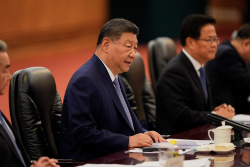American leaders insisted time and time again that they were "making progress" in Afghanistan. After invading the country to root out Al Qaeda in response to the attacks of September 11, 2001, the U.S. government spent 20 years, $2 trillion, and thousands of lives trying to overthrow the former Taliban theocracy that sheltered Al Qaeda and install a new Afghan republic. But in the summer of 2021, the Afghan republic suddenly collapsed, and the Taliban stormed Kabul. U.S. forces withdrew in chaos.
The leadership in Washington was obviously not leveling with the American public. Bodyguard of Lies, a documentary directed by Dan Krauss that premiers September 23 on Paramount+, exposes exactly what those lies are. Krauss, who has been reporting on the war in Afghanistan for years, interviews high-ranking U.S. officials, rank-and-file American veterans, ordinary Afghans, and even the Taliban. He also dips into an archive of private recordings and documents, released thanks to a Freedom of Information Act lawsuit by The Washington Post, in which American officials admit things that they wouldn't say in public.
On April 17, 2002, President George W. Bush said in a speech that previous empires have failed in Afghanistan, but "we're not gonna repeat that mistake." The same day, Defense Secretary Donald Rumsfeld dictated a memo in 2002 asking how to get out of Afghanistan—and ending with the exclamation "Help!" A few months later, Rumsfeld told the press that "I don't do quagmires." The movie is filled with examples of similar duplicity over the next two decades.
It didn't have to turn out this way. At the beginning of the war, the Taliban were almost completely routed, and the U.S. military could have left from a position of strength. The new Afghan republic announced that it had an offer from the Taliban to surrender in exchange for amnesty and a chance to participate in politics. But the Bush administration turned down that offer, settling for nothing less than total, unconditional victory.
"It was very hard to leave Afghanistan, knowing that Osama bin Laden might still be there. That was one important factor. I think the other thing was that, as George Bush said, 'We're not going to just cut and run.' There was a feeling of—I guess you could describe it as goodwill—from the American leadership, the American public, to not leave Afghanistan a destroyed country with no infrastructure or leadership structure. We wanted to stick around long enough to help rebuild the country, and hopefully create a beacon of democracy in the Middle East," Krauss tells Reason in an interview.
That, of course, didn't work. Bodyguard of Lies breaks down the specific ways in which the project broke down. U.S. officials measured their success with irrelevant or nonsense metrics, often linked directly to how much money was spent. Local powerbrokers were constantly skimming off of that money. For example, one Afghan official would receive U.S. funding to repair a particular bridge, then call his brother in the Taliban to blow up that bridge again, so he could receive more money to fix it.
"One of the things that I don't think I fully understood until I sat down and started working on this film was the degree to which we partnered with warlords in Afghanistan, and the degree to which warlords were actually an integral part of our tactical approach in Afghanistan," says Krauss.
In one particularly infamous episode, U.S. forces raided a home where they were told a Taliban commander was hiding, killing several civilians. They later discovered that the house actually belonged to a warlord whose men had a contract to guard a British base—and that the allegations of Taliban presence came from a rival warlord who wanted the contract himself. In other words, Afghans were using the U.S. military to carry out mob hits on each other.
"It was one of those phrases that was repeated, almost verbatim, over and over again: the corruption, the corruption, the corruption of the Afghan people. Look, that's true. There was a ton of corruption in Afghanistan. There's no question about that. But the corruption was enabled by the overflow of U.S. currency being flown in on palettes in the back of C-130s," Krauss says, referring to C-130 cargo planes.
And Americans themselves dipped their hands in the pot. The film includes an interview with a U.S. soldier whose commander would file false supply orders and then pocket the cash, smuggling it back to America inside hollowed-out VCRs. According to The Fort Bragg Cartel, a recent book by investigative journalist Seth Harp about corruption within the ranks of U.S. special forces, American troops were convicted of stealing a total of $52 million in Iraq and Afghanistan between 2005 and 2015, along with many thefts that were never caught.
Those thefts were relatively small scale compared to the massive profits, legal and illegal, that American contractors made. Contractors made $108 billion for work performed in Afghanistan throughout the entire war. The Commission on Wartime Contracting in Iraq and Afghanistan estimated in 2011 that waste, fraud, and abuse within those contracts totaled between $31 billion and $60 billion.
"There was money for everyone, and that was one of the reasons the war lasted as long as it did," Krauss says. He quotes a joke that Capt. Matthew Hoh, a former Marine and State Department official who resigned from the Obama administration in protest of the war, told him: "Reconstruction wasn't successful in Afghanistan, but it was very successful in northern Virginia and the suburbs of Washington."
The post The Government Was Lying to You About Afghanistan. Dan Krauss Has the Receipts. appeared first on Reason.com.













 Bengali (Bangladesh) ·
Bengali (Bangladesh) ·  English (United States) ·
English (United States) ·